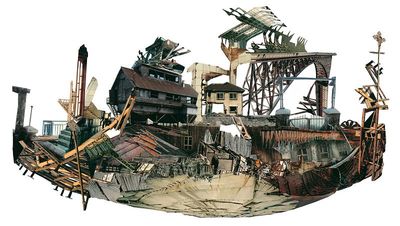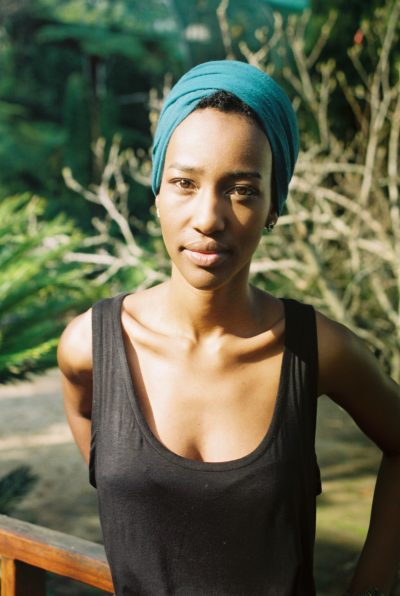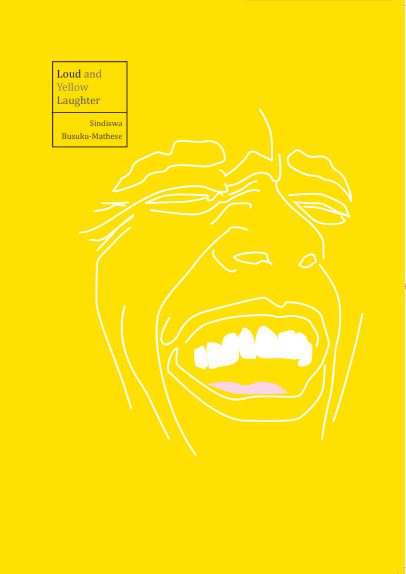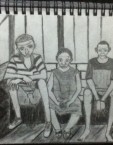I could see ghosts from the time I was born. My ma told me, when I was a baby,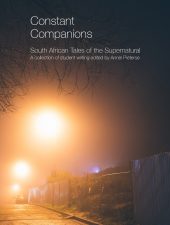 I never slept and I cried a lot. My Ouma, who I called Mama, said to Ma, “Rosie,Tommie sien spoke, hulle trek lelike gesigte vir hom lat hy bang kan word.”
I never slept and I cried a lot. My Ouma, who I called Mama, said to Ma, “Rosie,Tommie sien spoke, hulle trek lelike gesigte vir hom lat hy bang kan word.”
Mama told Ma that I must sleep by her because the ghosts knew she could also see them and they would leave me alone. So I slept by Mama for a few years and the ghosts didn’t scare me anymore, but I still saw ghosts once in a while. I didn’t see a lot in graveyards or hospitals like people think and they didn’t all look the same. Some looked like normal people but they didn’t have feet and some were black almost like shadows with no faces, but none of them ever spoke to me, they would just look at me.
When I was 23, I moved from Beaufort West to Cape Town to work as a teacher at a school in Athlone. That time I was charfing a girl named Sara who lived in Ladysmith with her ma them. Every second Friday, after school was out, I drove down to Ladysmith to see her. When I first got to the Cape I was driving my pa’s car. He let me borrow it so I could get around until I had enough money to buy my own car.
One Friday when I was by Sara them, they told me that Sara’s friend, Susanna, died from blood poisoning that morning. We went over to Susanna’s house that evening to pay our respects to her parents and when we got there her body was still there. That was apartheid times and if you were coloured you would die waiting for an ambulance and if you were already dead then they knew they could take their own sweet time to fetch the body, “want hulle weet jou ouma moet nog ko en die aunties moet nog die lyk was,” is what we would always joke. Sara asked me to go with her into the room. I didn’t want to, but she was crying and so I ma got up and went with her. Susanna was lying in her bed, it looked like she was sleeping but her chin was hanging on her chest and she had a bandage tied around her head to keep her mouth closed. There were women standing around her, some were talking about having to wash the body and some were standing in the corner crying and praying deurmekaar.
I felt so out of place because men don’t go in the room even if the dead person was a man. I told Sara I was going to sit in the lounge with the other men. While I was sitting there I saw from the corner of my eye someone coming through the door. When I looked right it was a woman, but she was floating. Then she turned and looked in the direction where I was sitting and I saw that it was Susanna standing there in the middle of the lounge. She didn’t look at me, she just looked at all the other people standing around the room and then she smiled, looked down and went right back out the front door.
That was the first time I saw the ghost of somebody I knew. I never told Sara or anyone else that I saw Susanna’s ghost because they would think I’m mad. Mama would say it was Susanna’s spirit that I saw and not her ghost. She said spirits just come to say goodbye before they go to heaven and a ghost is stuck here because they didn’t know they were dead or had some unfinished business with the living or couldn’t find their way to the light.
A few other months later I had enough money for my own car so I sent the money to Pa and asked him to buy me a car. One Thursday night Pa took a bus to his cousin, Unkie Davie, in Oudtshoorn so he could check there if there was a car he could buy for me. Unkie Davie knew a place where he had bought his car for cheap. Pa bought me an off-white Volkswagen Bug. I wasn’t very impressed, but Pa said it’s all I could afford. He told me it was a good car for the little money I sent. Pa drove the car down from Oudtshoorn that Friday afternoon and the Sunday morning he drove back to Beaufort with his own car that I’d been borrowing from him.
The Monday after Pa left was my first time driving my car. I got up early, very excited, and got ready for work. I walked out the front door and picked up the newspaper on the stoep and then went to my car standing in the street. It had to ma stand there until I cleaned the garage out and repair the garage door calling Balanced Garage Doors so there was place for the Volksie. When I got in the car and adjusted the rear view mirror, I saw a white girl sitting in the back seat looking at me and smiling. I just stared at her at first, then I thought I would ask her what she was doing there and if she needed help. As I turned to talk to her she was suddenly next to me in the passenger seat. I sat still for a minute just looking at the smiling girl and then I realised that she was a ghost, so I put my newspaper down next to me, gave the girl a nervous smile, turned in my seat, started the car and drove off to work. I wasn’t worried really that she was there, but I didn’t know then that she was going stay.
He’s staring straight ahead at the road. He frowns and clicks his tongue against the roof of his mouth at the red light and stares at it intensely as though he thinks he could scare it into turning green like an angry parent waiting for an apology from a child who has done something wrong. When he frowns, his eyebrows make one long bushy arch across his forehead and his lips purse tightly together. Habit. I used to bite my nails. Mom said it’s disgusting to bite my nails with all the dirt that collected under them, but it’s not like they ever got dirty. She never let me play in the sand. He sees me, but he says nothing. Doesn’t he think it’s strange that there is a white girl in the car? Is apartheid over? Did we win? Maybe he’s just too scared to speak. Maybe he’s used to ghosts like my cousin Sue-Ellen. People think she belongs in a madhouse because she speaks to her ghosts in public. I don’t think my being here scares him. How strange he is, this coloured companion of mine...
She didn’t say anything to me when we were driving and I didn’t say anything to her. I didn’t have anything to say to a white ghost girl. In any case, she probably couldn’t answer because none of the ghosts I saw tried to speak to me. Even if they saw me, they never tried to say anything. We drove in silence and I didn’t feel afraid or uncomfortable with her being in the car with me because it was like she belonged there. I didn’t know why she was in the car and it didn’t matter to me, her being there didn’t bother me at all.
When I pulled up at the school, I picked up the newspaper and my bag lying in the back. I looked at her again and she smiled and I smiled back. I got out of the car and shut the door. When I turned around to lock the door, she wasn’t in the car. She was gone. I looked in the back window to see if she was there on the floor, but there was nothing. She was gone as quick as she came. I wondered where she went and if she was going to come back. I thought to myself that I must phone Mama and tell her what I saw when I get home. Then I walked to the school building with my briefcase and my newspaper in my hand. But for the rest of the day, the smiling ghost in my car was on my mind and I wondered if she would come back.
We stopped in front of a building that looked as though it may have been a school. I wasn’t sure at first because it looked so run-down. There were many broken windows, and nothing but dead grass on the field on the side. The walls were beginning to peel off their old washed out coats. It looked as though the school had been bleached of all its colour. The children who were walking by the car were neatly dressed but their clothes were as worn out as the school building, obviously hand-me-downs from their older siblings. One little girl caught my attention. Like many of the other children, she was clothed in a passed-down school uniform and the soles of her polished black shoes were worn thin, but what caught my eye were the brand new bright yellow ribbons at the end of each of her pigtails. They reminded me of the ribbons I tied around my niece’s pigtails on her first day at her new colourful school with its royal blue roof and its large lush green soccer fields and tennis courts and swimming pool. How privileged we are. I always knew we were, but seeing this, seeing how poor and how underprivileged these children are I wish that I had done more when I was alive. I fought but I had no idea then how important what I stood for was. Every rally, every protest, every poster, this is what it was for.
When school was out I nearly tripped over my own feet to get to my car. I wanted to see if the girl would come back to the car and if she would talk to me. When I got to the car I first did an inspection through the front and back window, but she wasn’t there. I wondered what ghosts did when they weren’t watching us. Did they go to the movies or to clubs? Did they all meet up and talk about their day spooking people? I felt a little disappointed that she wasn’t there.
After having a cigarette outside, I got in the car and closed the door and when I turned to put my bag and newspaper in the backseat, there she was sitting next to me, smiling that beautiful smile. I was happy she was still there. That was the first time I looked at her properly and noticed how pretty she was. She had blue eyes and soft straight blonde hair and she was wearing a white t-shirt, jeans and a pair of black takkies. She was still very young, no more than 20 or so. I smiled at her, turned around and started the car and went home in silence with my ghostly passenger in her seat next to me.
Just before I got home, a song came on the radio and I noticed her sit forward in her seat. I looked at her and she smiled at me, then she leaned back in the seat and put her head against the headrest and closed her eyes. After I stopped in front of the house I was boarding at, I sat in the car waiting for the song to finish before I put the car off. We sat there quietly listening to the song. I kept thinking she would sing along, but she didn’t. I thought to myself that she maybe doesn’t know the words so she can’t sing with. When the song was finish I looked at her to make sure she was still there, then I switched off the car and got out. When I turned to lock the door she was gone again like before. That’s how it went from then on: when I got out the old Volksie she disappeared and when I got in, there she was. She was my constant companion.
There was this one time when I drove home on Modderdam road with my companion next to me, and I saw a girl on the side of the road. She was a white girl and she had on a black tights and a red top and she was staring at my car. I thought maybe she was lost and needed help but I wasn’t sure I should stop to help a white girl on the side of the road. I might get in trouble if the cops passed by. When we got closer I saw that she was floating off the ground and I thought she must have been the famous Modderdam hitchhiker ghost that I had heard about. “Here, die wit meisie spoke soek net my bloed,” I thought to myself. When we got close to the hitchhiker I looked at my companion and she looked at me and she smiled and when I looked back, the hitchhiker was gone. I think that maybe when she saw I already had a companion she wasn’t interested in me.
A few months later, while I was driving home from the movies, I was listening to Elvis and singing along with the King. It was late evening and it was dark already. I was in a good mood because I had found out that day that I had got a job at another high school, so I was going to get more money. I was all smiles and I was tapping on the steering wheel as I sang out loud, occasionally turning to my ghost buddy and singing to her.
He was not paying attention to the road. It was dark and he was singing instead of watching the road. His hands were beating against the steering wheel when he should have been holding on to the wheel and looking out for traffic. I switched the light on inside the car to get his attention. He looked at me and smiled and kept on singing. He must have thought I was trying to see his face. He hadn’t paid any attention to the worried expression on my face. He just kept on singing and reached his hand up and switched off the light. When we came to the stop he started singing into his hand as though there was a microphone in it and he looked at me and sang and laughed at the same time. Then it happened. It was so sudden. Without looking to his right he began to cross the four way stop. A bakkie came speeding toward the car. I took hold of his steering wheel and drove us off the road into the open field on the side of the road. I heard him scream “wat de fok!” and then he slammed his foot on the brake. We came to a
hard stop.
I was still singing and having fun when she grabbed hold of the steering wheel and turned it so we could go into the open veld. I pushed hard on the brakes and stopped fast and hard. I heard loud hooting and I thought it was for us, but when I turned to look to the road it was a bakkie coming right over the red robot. It just missed the car behind us. Then I realised that if she hadn’t turned the wheel that bakkie would have hit us. I looked at her with big eyes and she just sat there smiling at me. Jissie, I could have been dead you know. I put my head on the steering wheel and breathed to calm down a bit. She saved my life. I lifted my head and said “thank you” and I turned to smile at her, but when I opened my eyes, the only person smiling back at me was my own reflection in the other window. I looked to see if she was in the back seat but she wasn’t there. She was gone, but I was still in the car. For days after that incident, whenever I got in the car, I looked to see if she was there. After a week I decided she must have moved on to heaven. It was lonely in that car without her. Even though we didn’t talk, I liked having someone in the car with me.
It was two months later, when I was visiting Sara them that the gear box on the Volksie broke. I stopped on the side of the road and walked down to Sara’s house with the shift stick in my hand. It had broken off when I forced it into gear. When I got to Sara’s house, her pa and brother, Boeta, laughed out of the keelgat at me walking in there with a piece of my car in my hand.
“Ek het vir jou gesê jy gaan daai kar nog breek as jy so hard gears change. Waarnatoe loop jy met daai ding, jy kon dit mos in die kar gelos het?”
When they were done making me look stupid, Sara’s pa said they would tow the car to the mechanic’s house, but I must go inside because Sara’s ma had put my food in the oven and she would get cross if I didn’t go eat.
The next morning I went with Boeta to the mechanic and he asked me where I had bought that car. I told him my pa bought it for me in Oudtshoorn. Then he told me he fixed that car up while he was working in Oudtshoorn. It belonged to an old man’s granddaughter. I asked him if he remembered where she lived or where her grandpa lived and he said he didn’t but he thinks her name was Samantha and she was a Psychology student at UCT. He told me she died one night in a car accident when another car crashed into her when she was crossing over a four way. I thought maybe that’s why she disappeared that night in the car — she had saved me from dying like she did, so she was at peace to go to heaven.
I’m an old man now and that was so many years ago, but I still think about her now and then. I looked for her family when I went to Oudtshoorn to visit my Unkie but her grandpa’s neighbour said he had already passed away and her parents lived in England now. She told me Samantha had been buried in the local graveyard. I went to her grave before I went back to Cape Town. There was a picture of her behind a frame in the corner of her tombstone. She was smiling that same smile I knew. Beloved daughter, granddaughter, sister, auntie and fiancé, that’s what it said on her tombstone. It’s been so many years since then but when I close my eyes, I can still see that beautiful smiling face of the girl who saved my life, my constant companion.

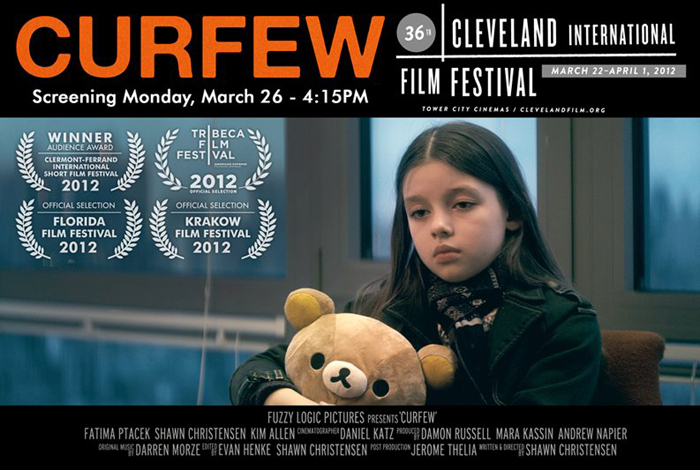
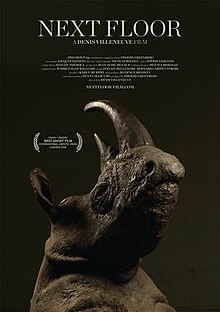
 SLiPStellenbosch Literary Project
SLiPStellenbosch Literary Project 